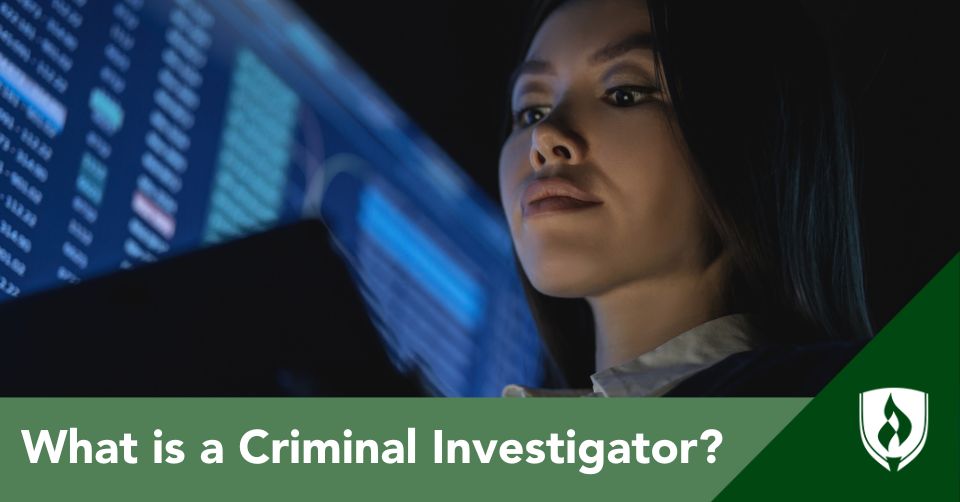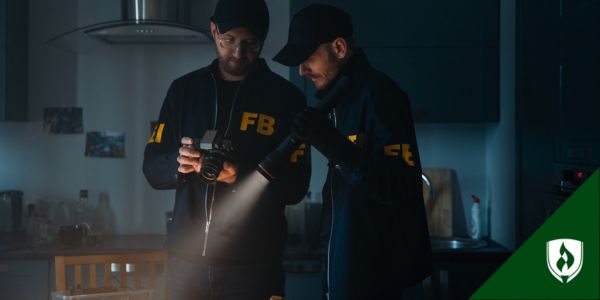
Gather facts.
Collect evidence.
Solve crimes.
The idea of detective work interests you. You think you might want to start on a pathway to becoming a criminal investigator, but you want to get a better idea of the role before taking any next steps. From what they do to how to become one, here's an overview of this particular type of law enforcement officer.
What exactly is a criminal investigator?
In general, the terms 'detective' and 'criminal investigator' are used interchangeably. Criminal investigators may also be called agents or special agents, and they may be uniformed or plainclothes officers.
Their job? To gather facts and collect evidence related to criminal cases, according to the U.S. Bureau of Labor Statistics (BLS).1
What do criminal investigators do?
Interviewing witnesses, examining records, monitoring suspects and participating in raids and arrests are all part of a criminal investigator's job. They typically investigate serious crimes, such as assaults, robberies and homicides.
In large police departments, detectives and criminal investigators usually specialize in investigating one type of crime or area of criminal law. These areas can include homicide, fraud, narcotics, missing persons and more.
Criminal investigators are typically assigned cases on a rotating basis and continue to work on them until an arrest is made, a trial is completed or the case is dropped.1
What are some common criminal investigation job duties?
Police officers, detectives and criminal investigators all typically do the following to various degrees, according to the BLS.1
- Respond to emergency and nonemergency calls
- Patrol assigned areas, observing people and activities
- Conduct traffic stops and issue citations
- Search restricted-access databases for vehicle or other records and warrants
- Obtain and serve warrants for arrests, searches and other purposes
- Arrest people suspected of committing crimes
- Collect and secure evidence from crime scenes
- Observe the crime scene and activities of suspects
- Write detailed reports and fill out forms
- Prepare cases for legal proceedings and testify in court
Of course, specific job duties will always differ by employer and function.
Detectives play larger roles in criminal investigations than entry-level police officers, but both positions are legally required to write detailed reports and keep meticulous records of their cases. Most of these officers also carry law enforcement equipment such as radios, handcuffs and guns.
Where do criminal investigators work?
When it comes to typical job settings, the largest employer of police and detectives is the government. 96% of police and detectives were employed by the government in 2023, and 4% were employed by state, local and private educational services.2
Regardless of their specific employers, criminal investigators (like many other law enforcement officers) will regularly work at crime and accident scenes. In addition to working wherever their assignments are, some federal law enforcement agencies—such as the Federal Bureau of Investigation and U.S. Secret Service—may require extensive travel.2
An agent who works for a federal law enforcement agency may actually end up relocating multiple times over the course of their career. Criminal investigators employed by agencies such as U.S. Border Patrol will tend to work outdoors in various terrains and weather conditions.
The bottom line? Common job settings and locations for criminal investigators can vary greatly depending on who they work for, as well as their specific roles and assignments.
What is the job outlook for criminal investigators?
Detectives and criminal investigators held about 113,400 jobs in 2023, and the employment of detectives and criminal investigators in particular is projected to grow 2% from 2023 to 2033.4
An overall desire to increase and maintain public safety may result in a need for more officers and detectives over time. That said, the demand for these roles is always expected to vary by location since the employment of criminal investigators is largely driven by local and state budgets.
What skills do criminal investigators need?
Now that you know a little bit about where criminal investigators work and their typical job duties, you may be wondering what makes someone a good fit for the role. From mental skills to physical strengths, here are some important qualities of criminal investigators.3
Communication skills
From speaking with people about an incident to writing detailed reports, strong verbal and written communication skills are a must for criminal investigators.
Empathy
At the end of the day, criminal investigators should want to help crime victims and the overall public. They need to be open-minded and willing to understand the perspectives of all different types of people.
Good judgment
All police, detectives and criminal investigators should be able to determine the best ways to solve a wide range of problems—and continue to adapt as more pop up.
Leadership skills
As members of law enforcement, criminal investigators must be comfortable being highly visible members of their community. They should be able to take charge and help the public in emergency situations.
Collaboration skills
From forensic science professionals to crime scene investigators and other law enforcement professionals, being an effective criminal investigator requires working with different units and teams to reach a conclusion.
Perceptiveness
Detectives and criminal investigators must be strong observers who are able to anticipate people’s reactions and understand why they may act in a certain way.
Physical stamina
Officers and detectives must be in good physical shape, both to pass required tests for entry into the field and to keep up with the daily tasks of the job.
Physical strength
Police officers must be strong enough to physically apprehend suspects, as well as assist people in precarious or potentially dangerous situations.
How do you become a criminal investigator?
Becoming a criminal investigator typically involves a combination of education, training and work experience. The requirements for each vary based on a range of factors, but most candidates must usually be at least 21 years old and able to meet certain physical and personal qualifications. The rest of the requirements typically include the below.3
Education requirements
Police and detective applicants must have at least a high school diploma or equivalent, although some federal agencies and police departments may require completed college coursework or a college degree. Many colleges and universities offer four-year programs in law enforcement and criminal justice.
Each federal, state or local agency determines its own requirements for licensure of law enforcement careers. Licensed law enforcement careers include police officer, crime scene investigator, and other positions. Minimum educational standards for licensure in these careers range from a high school diploma to a college degree and can vary widely (even within the same state).
Some agencies require graduation from an agency-approved academic program or training academy. Rasmussen University’s Criminal Justice Associate’s Degree and Criminal Justice Leadership and Management Bachelor’s Degree programs are not a training academy or approved programs with any federal, state, or local agency.
While a criminal justice program may be the most straightforward pathway, other common areas of study include security and protective service, as well as the social sciences. Rasmussen University does not offer any programs that lead to credentials in security and protective services and social sciences.
Training requirements
Any law enforcement candidate usually attends a training academy or police academy before becoming a police officer. Training typically includes classroom instruction in state, local and constitutional laws, civil rights and police ethics, as well as supervised experience in subjects like patrol, traffic control, firearm use, self-defense, first aid and emergency response.3
The Law Enforcement Associate’s Degree program at Rasmussen University does not meet standards of states other than Minnesota. Additional training and education may be required for licensure in other states. This program is only open to residents of Minnesota, or those willing to sign an attestation of their intent to seek employment in Minnesota as a peace officer.
Federal law enforcement agents undergo more extensive training, usually at the U.S. Marine Corps base in Virginia or at a Federal Law Enforcement Training Center.
Work experience requirements
Because they need law enforcement experience, detectives and criminal investigators typically begin their careers as police officers.3 They'll usually spend a few years as officers before becoming eligible to move up the ranks to detective status.
Do you think criminal investigation might be for you?
If all of this information further fuels your interest, then continuing to learn more about a career in criminal investigation is a great idea. Discover more about what it takes by checking out our article, " 7 Signs You Should Consider a Career in Criminal Justice"
Each federal, state, or local agency determines its own requirements for licensure of law enforcement careers. Licensed law enforcement careers include police officer, crime scene investigator, and other positions. Minimum educational standards for licensure in these careers range from a high school diploma to a college degree and can vary widely (even within the same state). Some agencies require graduation from an agency-approved academic program or training academy.
The Law Enforcement Associate’s Degree program at Rasmussen University does not meet standards of states other than Minnesota. Additional training and education may be required for licensure in other states. This program is only open to residents of Minnesota, or those willing to sign an attestation of their intent to seek employment in Minnesota as a peace officer.
Rasmussen University’s Criminal Justice Associate’s Degree and Criminal Justice Leadership and Management Bachelor’s Degree programs are not a training academy or approved programs with any federal, state, or local agency. Other non-academic requirements are also required for licensure, which may include additional training, experience, graduation from an academy, physical fitness standards, background checks (certain results are often disqualifying), and other requirements. Before enrolling, it is important to understand whether licensure is required for a desired career by consulting federal, state, or local agency requirements.
1Bureau of Labor Statistics, Police and Detectives, [Accessed October 2024] Employment conditions in your area may vary. https://www.bls.gov/ooh/protective-service/police-and-detectives.htm#tab-2
2Bureau of Labor Statistics, Police and Detectives, [Accessed October 2024] Employment conditions in your area may vary. https://www.bls.gov/ooh/protective-service/police-and-detectives.htm#tab-3
3Bureau of Labor Statistics, Police and Detectives, Employment conditions in your area may vary. [Accessed October 2024] https://www.bls.gov/ooh/protective-service/police-and-detectives.htm#tab-4
4Bureau of Labor Statistics, Police and Detectives, [Accessed October 2024] https://www.bls.gov/ooh/protective-service/police-and-detectives.htm#tab-6




